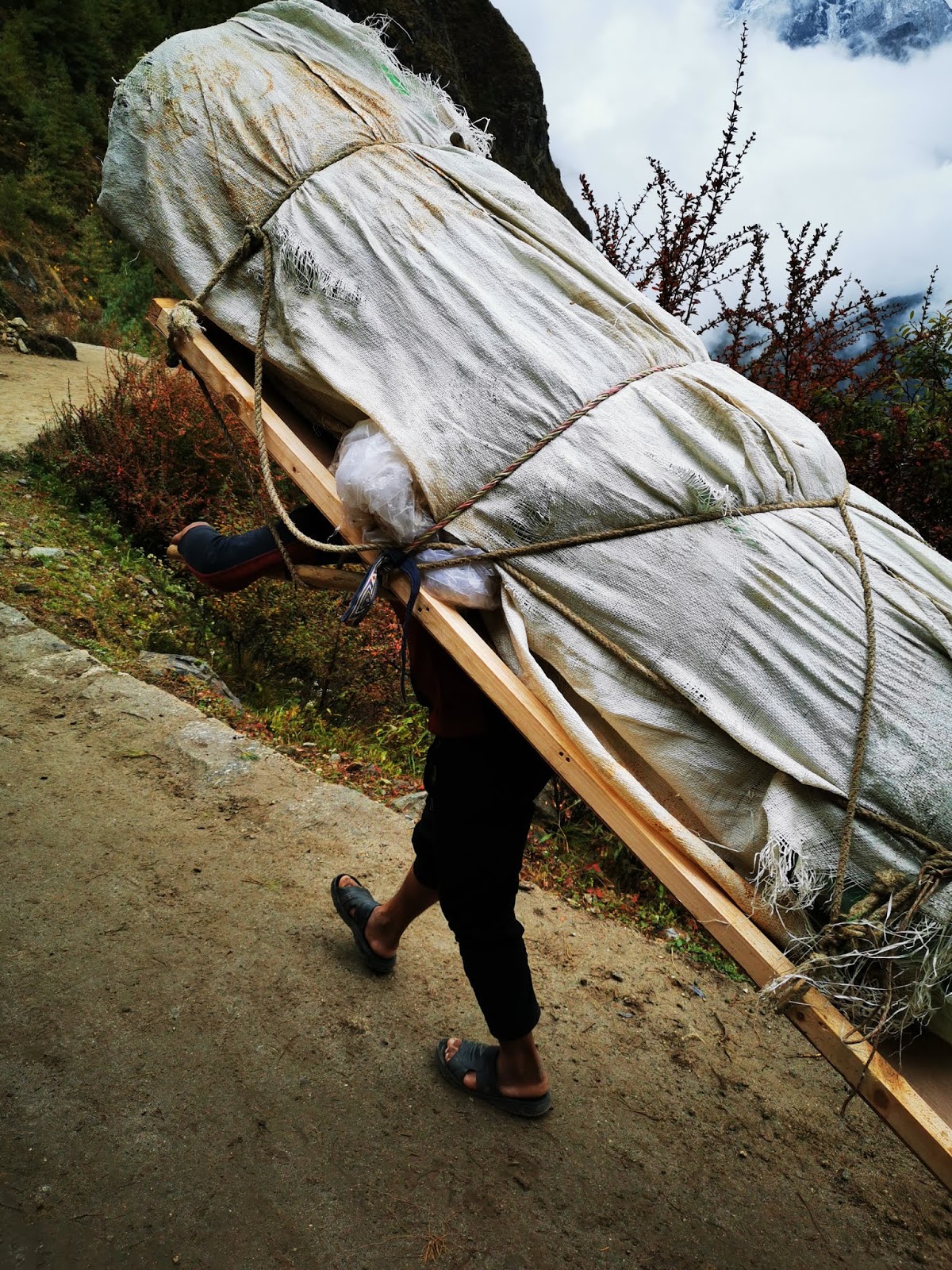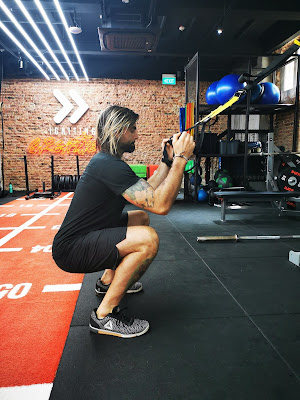Forget what you think you know about fitness
I've been in the fitness industry for well over a decade now and have a tonne of courses and certificates coming out of my ears, with regards to movement, nutrition and mindset. But my recent adventure to Everest Base Camp (EBC), taught me something completely new and completely unique about fitness, (as I was getting overtaken by 60+ year old sherpas, carrying upto 150kg loads on their heads, 5000m above sea level).
5 of the best exercises for trekking to EBC
1. The TRX squat: On the trek, the need to get arse-to-the-grass low is essential for one reason, to poo! When you get caught short, believe me, you would rather go in woods, bare cheeked to the world, over using some of the local public toilets. If you don't work on any of the other exercises, please work on these and thank me later.
2. Internal/external rotated step downs: The team really struggled with the descents and the impact from walking down hill and stepping down giant rocky-uneven steps. So these will better prepare the joints for different loads at different angles and at different speeds.
3. Multi-planar Bosu lunges: The terrain is so un even and temperamental, that the ankle and knee is constantly being challenged in different directions and the body constantly needs to correct itself to avoid injury. The BOSU is a great way to simulate those uneven surfaces.
4. Stepper with back pack: Specifically smaller steps. The reason being, you can't take long strides on the trek, because you'll burn out too quickly. The short steps will get you used to just putting one foot in from to the other. The other thing about taking smaller steps on the stepper, where you're being forced into a shorter stride, your less likely to strain the achillies (from putting much range of motion through them) and make better use of the glutes. The back pack will also get your body used to carrying what you will be on the long days. Just load up the back pack progressively.
5. Single leg clock reaches: The downhill will drain you the most for sure. The ankle, knee and hip need to communicate, or else risk injury, especially under load. Working on the single leg stuff, will get a better connection between the joints and also fire up the glutes more, which will reduce too much adduction (knee buckling inwards) and repetitive punishment.
The best nutrition in preparation for EBC
As always a well balanced eating routine is going to be best for you, there is no special 'diet' that's going to get you to the top, for multiple reasons, you just need to make sure you keeping eating. When you start getting higher, your appetite will decrease and that's when you actually need to eat more. Aim to eat at least*:
- 1-2 fist sizes of veggies, for phyto-nutrients and fibre.
- Approx 1 - 2 full cupped handfuls of carbohydrates of any kind (unless they don't agree with you), but do not cut them out.
- 1-2 palm sizes of protein (animal based, though not exclusively) to build and repair muscle and support the immune system.
- 1-2 thumb sizes of fat per meal, from naturally and the best quality sources you can afford. This also includes saturated fat (butter, ghee, coconut oil, olive oil, avocados, fish, nuts and seeds).
* These are base measurements, relative to individuals hand size.
Expect to see some considerable weight loss when you get back to normality. The main reasons are:
Expect to see some considerable weight loss when you get back to normality. The main reasons are:
- The decrease in energy from food as you go higher, because of hypoxia, limited menu, change in eating habits and gastric upset.
- Your Basal Metabolic Rate (BMR) increases. Basically your body has to work harder at rest, which burns energy. Put on top of that, the increase in work rate.
- A loss in body water, due to an increase in breathing rate, changes in water metabolism and general decrease in water intake (also possibly due to the lack of hydration in new 'dry' foods).
- Nutrient absorption is decreased through the intestinal tract, as digestion slows down.
- A decrease in muscle mass, as you're not lifting weights, or holding on to as much water.
When we returned, we spoke to our in-house nutritionist at Ufit, Pamila Ibarra. She says for OPTIMAL performance, climbers should be aiming to increase their carbohydrates (in grams) x5-7 times their body weight (kg). For example, I weigh 90kg x7 = 630g carbs per day. Realistically though, thats wasn't achievable (for myself). Firstly, because of the lack of appetite. Secondly, I knew the consequences of walking soon after eating ie, needing an emergency poo. Thirdly, I didn't want to eat the poor quality-shitty carbs.
There's other reasons too - the lack of menu and resources. You could take supplements etc, but they weigh excess, so counts towards your total luggage weight for the flight and to carry. I'd have rather taken extra warm kit, than extra sachets of glucose gels. However, that's not to undermine the advice, there are just other factors to take into consideration. But the main point is 'optimal' performance. So just eat as much as you physically can to get you through, it's only a few days in the grand scheme of things.
I'd always recommend taking a good multivitamin and quality fish oil. Pamela recommend that you get your Iron levels tested (both important for males and females) and supplement accordingly. The reason is quite 'sciencey', but you can read more about the reasons why here.
I don't tend to recommend using protein shakes and especially do not recommend you start on the trip, just because they can cause a lot of gastric upset. However, as a better alternative to other sugary snacks, it's probably a good shout. I personally bought carrots (the best you'll ever eat), apples, oranges and samosas en route from the locals-risky, but gorgeous.
Ultimately, you need to eat your way up the mountain. The goal is to get to the top, whatever it takes. So don't worry about putting on a bit of body fat because you've worked hard to lose it - you're probably likely to lose it again anyway. In my opinion, if you want to do this kind of challenge, then yes, aim to lose weight for for it. But cap it at 6 weeks beforehand. You can then concentrate on adapting your body to the less quality foods, that will have an uncomfortable impact on you on the trip.
I don't tend to recommend using protein shakes and especially do not recommend you start on the trip, just because they can cause a lot of gastric upset. However, as a better alternative to other sugary snacks, it's probably a good shout. I personally bought carrots (the best you'll ever eat), apples, oranges and samosas en route from the locals-risky, but gorgeous.
Ultimately, you need to eat your way up the mountain. The goal is to get to the top, whatever it takes. So don't worry about putting on a bit of body fat because you've worked hard to lose it - you're probably likely to lose it again anyway. In my opinion, if you want to do this kind of challenge, then yes, aim to lose weight for for it. But cap it at 6 weeks beforehand. You can then concentrate on adapting your body to the less quality foods, that will have an uncomfortable impact on you on the trip.
How fit do you have to be to climb to Everest Base camp
Keep it real guys.
Phil
If you would like some help and advice on trekking to Everest Base Camp, or any extreme cold weather endurance event, feel free to get in touch for a training support and preparation guidance.
phil@thefatlossandperformancecoach.com
For more information about and upcoming adventures with Ufit, just click the following link Ufit Retreats.





